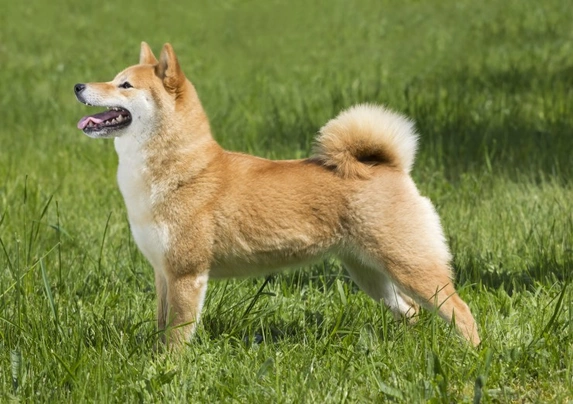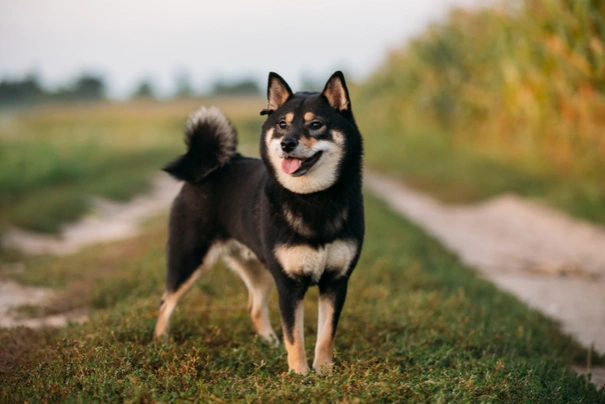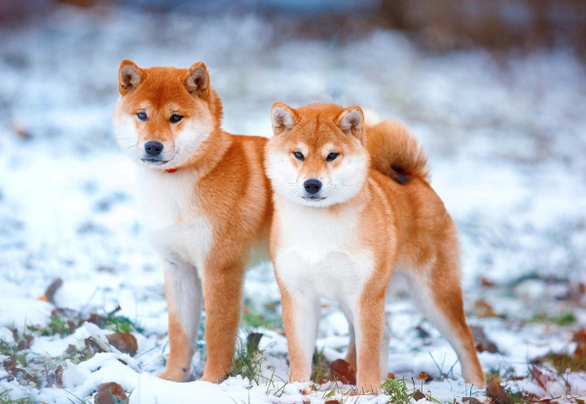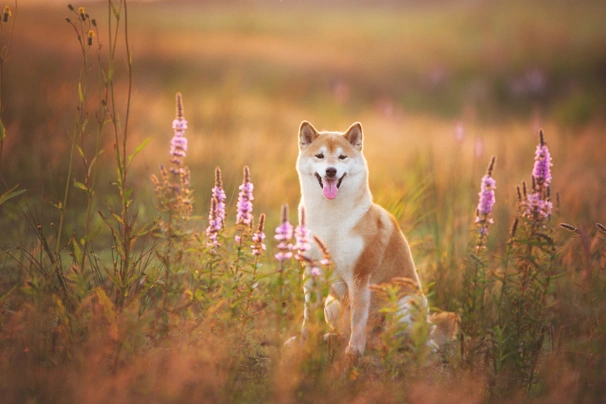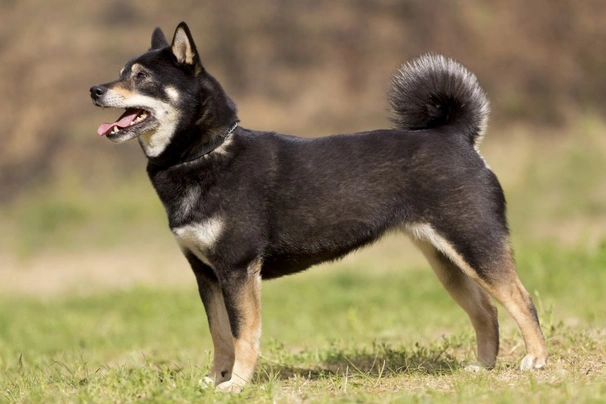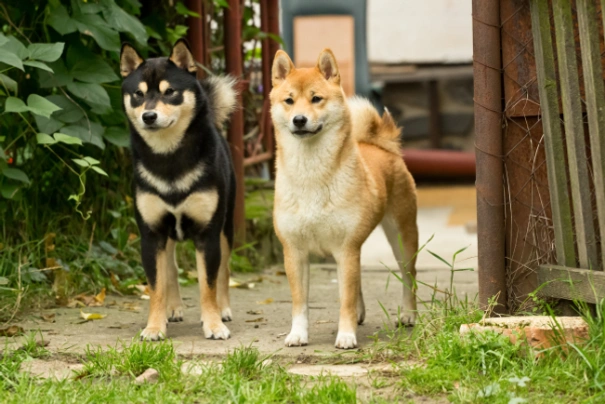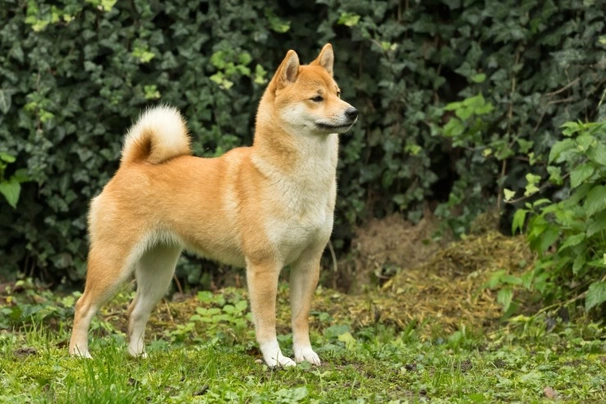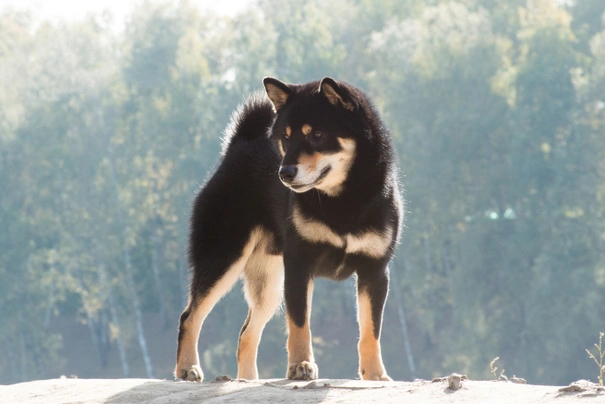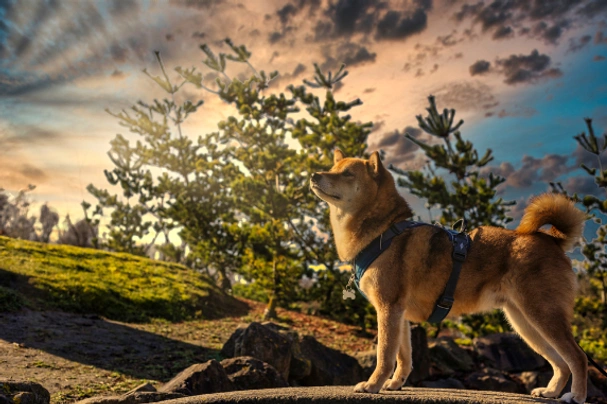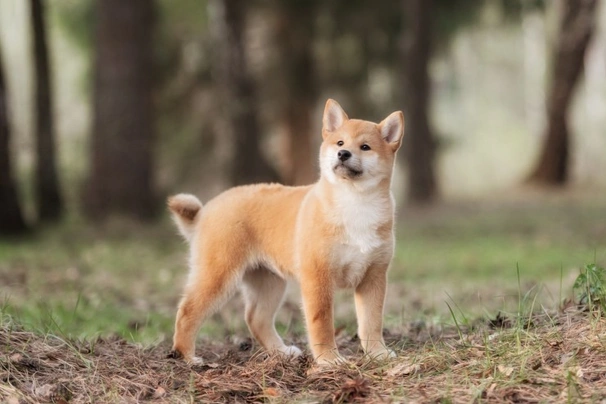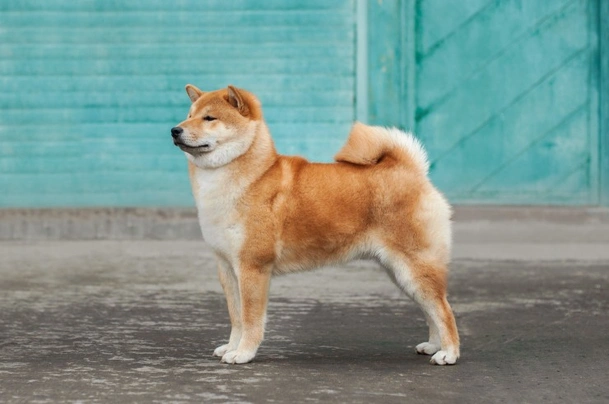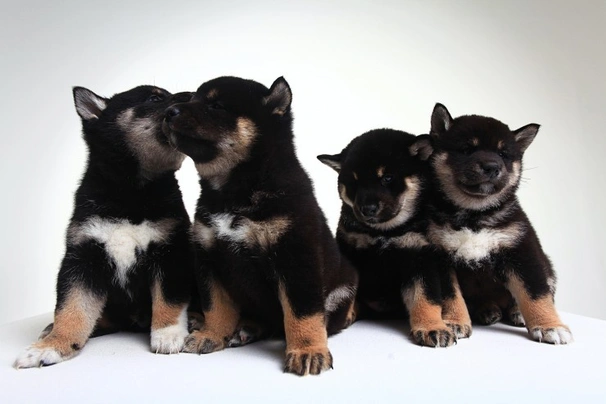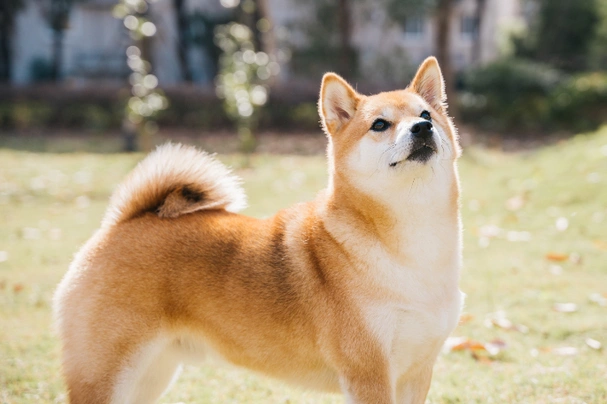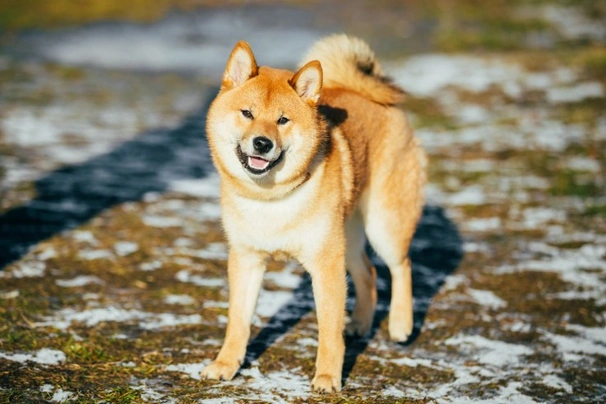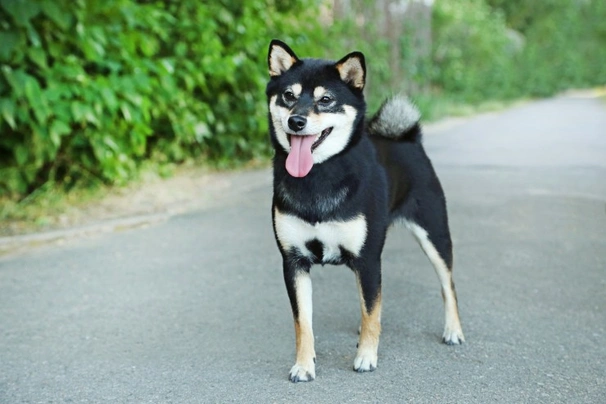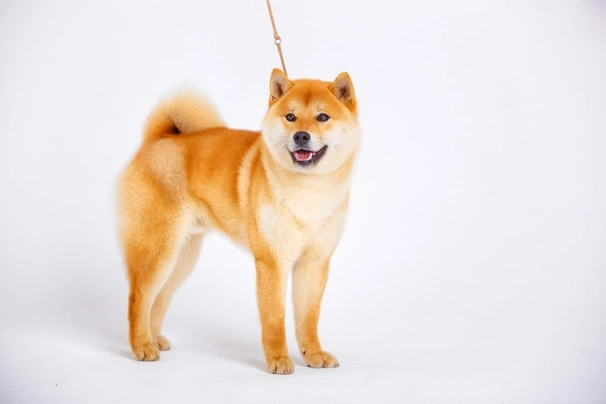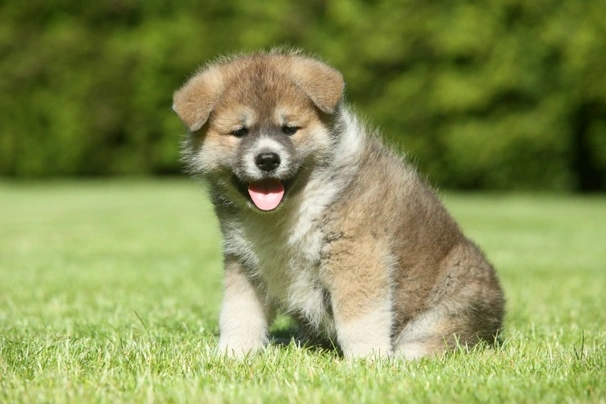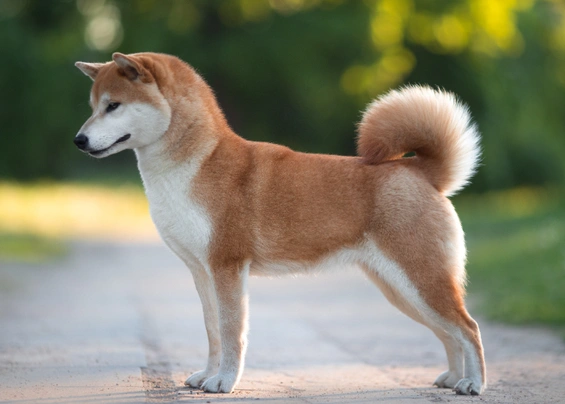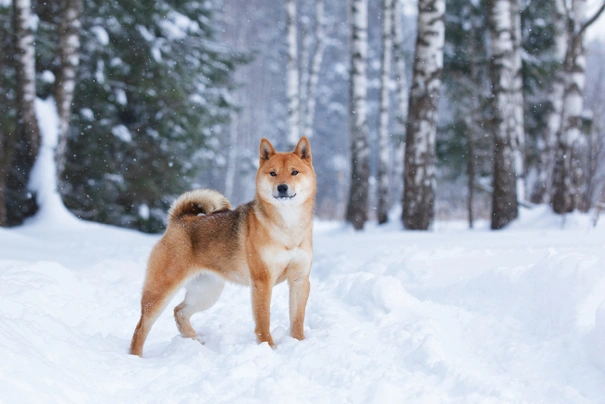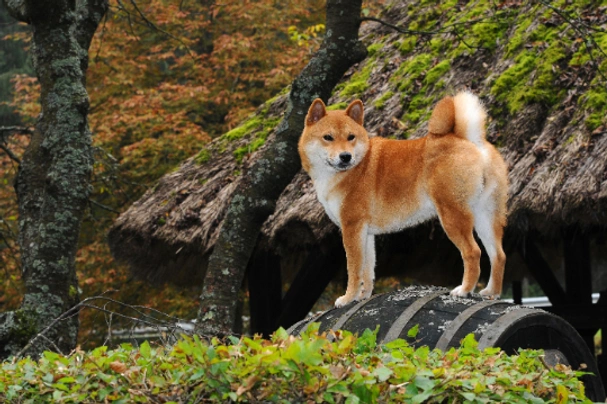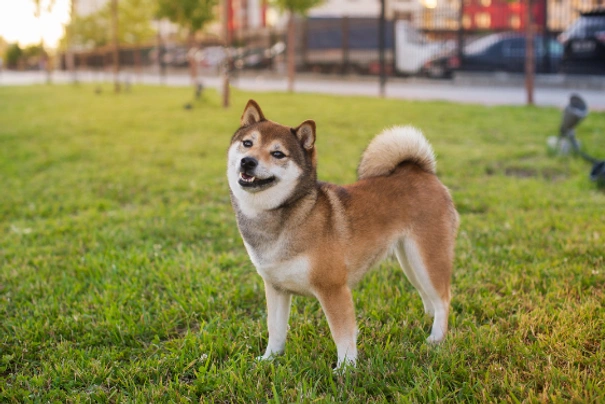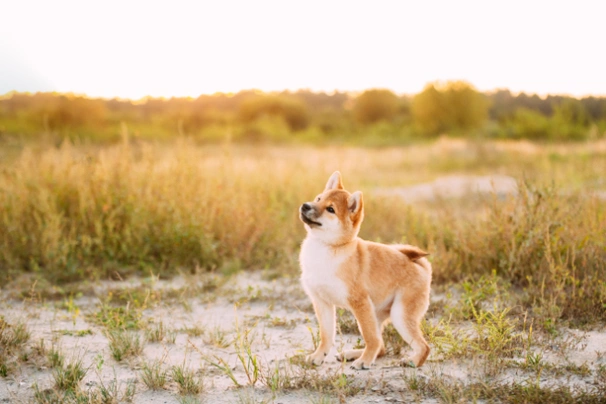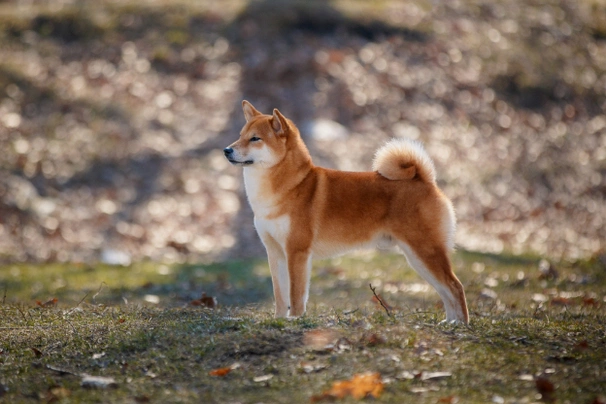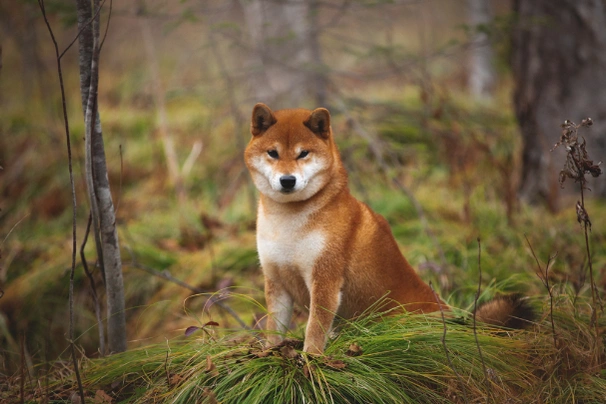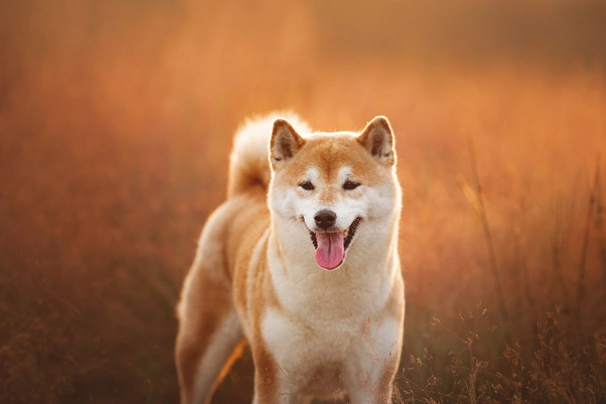Japanese Shiba Inu
Pros
Cons
Introduction of the Japanese Shiba Inu
The Shiba Inu is a neat Spitz-type dog their name literally means "small dog" in Japanese. They are in fact a smaller version of an Akita Inu and like their larger cousins they too were originally bred to work as hunting and working dogs. Shibas always seem to be interested in everything that goes on around them and over the years they have earned themselves a reputation for being reliable trustworthy and fun-loving family pets in their native Japan.
With this said the Shiba Inu has gained a lot of popularity elsewhere in the world including the UK although anyone wishing to share their home with a well-bred Japanese Shiba Inu would need to register their interest with breeders because pedigree puppies are hard to come by with few healthy well-bred puppies being registered annually with The Kennel Club and as such they can command a lot of money.
History of the Japanese Shiba Inu
The Japanese Shiba Inu is thought to be an ancient breed and their ancestry can be traced back thousands of years. Evidence of very similar looking dogs have been found on pottery and terracotta pots that date back to the 3th century BC. It is also thought immigrants first took their dogs with them to Japan during the 6000-7000 BC a time when the people known as Jomon-Jin settled in the country during the 1400s BC. These dogs were then interbred with local dogs and the result produced spitz-type dogs that boasted pointed erect ears and curly tails. With this said their actual origins remain clouded in the mists of time.
Originally there were three main types of Shiba each named after the regions where they were first bred. These were the Shinshu Shiba from the Nagano region the Mino Shiba from the Gifu region and the Sanin Shiba from the north-eastern region of the main land. Although similar the Shibas from each area contributed to differences seen in the breed today. From these foundation breeds 6 distinct dogs were developed with the Shiba Inu being one of them.
In 1928 the “Organisation to Preserve the Japanese Dog” was founded with an end goal being to save native breeds from vanishing altogether. The same year the first dog shows were held under the club's banner and they were an immediate success. However with the advent of World War II many Japanese breed numbers fell dangerously low which included the Shiba Inu but luckily their numbers were restored when dogs were found in the more remote regions of the land which were then used in breeding programmes to save the breed from extinction altogether.
The breed was only called Shiba Inus during the 1920's and by 1936 they were considered one of Japan's national treasures. Numbers fell dangerously low for a second time in the early fifties due to a serious outbreak of distemper. Yet again the breed had to be saved by using two types of Shibas one being a stockier heavier boned dog and the other being a longer legged dog found in other regions of Japan.
Today the Shiba Inu is still one of the most popular dogs in their native Japan both as companions and family pets and it is thought the dogs we see today are a result of the dogs that the Jomon-Jim people crossed with dogs that were imported from China. The breed is gaining popularity here in the UK thanks to their charming looks and their loyal fun-loving natures although few pedigree puppies are registered with The Kennel Club every year which means owners need to register their interest with breeders if they want to own a Japanese Shiba Inu.
Interesting facts about the breed
- Is the Japanese Shiba Inu a vulnerable breed? No although rare and anyone wanting to share a home with a Japanese Shiba Inu would need to go on a waiting list for the pleasure of doing so these charming dogs have become very popular in the UK over recent years
- The breed nearly died out altogether during the Second World War
- There used to be 3 types of Shiba Inus back in ancient times
- They have always been highly prized as hunting dogs in their native Japan
- The Japanese Shiba Inu is one of the most ancient recognised dog breeds in the world
- Shiba are often very cat-like in their behaviours and like to nap during the day and have even been known to purr
Appearance of the Japanese Shiba Inu
Height at the withers: Males 39.5 - 41.5 cm Females 36.5 - 38.5 cm
Average weight: Males 8.0 - 11.0 kg Females 6.8 - 9.0 kg
The Japanese Shiba Inu is one of the smallest of the Akita type dogs. They look very much like a smaller version of an Akita and are slightly longer than they are tall much like their larger Akita cousins. They have broad flat skulls and nicely muscled cheeks with a clearly defined stop and a charming furrow. Their muzzles are straight and taper gradually to a dog's nose. Their lips are tight and noses black although some white dogs have flesh coloured noses which is acceptable as a breed standard.
They have relatively small almond shaped eyes that are set well apart on a dog's face being a nice dark brown in colour. Ears are triangular shaped and small which dogs carry pricked and pointing slightly forward. The Japanese Shiba Inu has a strong jaw with a perfect scissor bite where their upper teeth neatly overlap their lower ones. Their necks are slightly arched and moderately long being thick and very well-muscled.
The Shiba Inu boasts having moderately sloping shoulders and well developed forechests with their front legs being straight and strong. They have quite high well developed withers level backs and short loins. Chests are deep and a dog's ribs are moderately sprung. Bellies are nicely tucked up adding to the Shiba Inu's athletic appearance. Back legs are powerful with long upper thighs and short but strong second thighs. They have very cat-like feet with well knuckled toes tough firm pads and strong dark nails. Tails are set high and thick which dogs carry curled in the shape of a sickle.
When it comes to their coat the Japanese Shiba Inu has a straight hard outer coat with a much softer dense undercoat. The hair on a dog's tail is slightly longer than on the rest of the body. The accepted breed colours for Kennel Club registration are as follows:
- Black & Tan
- Red
- Red & White
- Red Sesame
- Sesame
- White
Gait/movement
When a Japanese Shiba Inu moves they do so lightly with a quick and energetic gait covering a lot of ground when they do.
Faults
The Kennel Club frowns on any exaggerations or departures from the breed standard and would judge the faults on how much they affect a dog's overall health and wellbeing as well as their ability to perform.
Males should have both testicles fully descended into their scrotums and it is worth noting that a dog can be a little lighter or heavier as well as slightly taller or shorter than set out in the Kennel Club breed standard which is given as a guideline only.
Temperament of the Japanese Shiba Inu
The Japanese Shiba Inu is an alert inquisitive and playful character and one that forms a strong bond with their owner and families. They tend to be a little wary and aloof around people they don't know but once they get to know someone they are usually fine with them. They boast having some quite cat-like traits and much like their cousins the Japanese Chin they will drape themselves on the backs of chairs wash their faces using their paws and purr very much like a cat when being petted.
The Shiba is often referred to as being a big dog in a small dog's body and they are known to play "rough". If allowed they will become the "top dog" in a household which is something to be avoided at all costs. As such this dominant side to their nature should be gently curbed from a young age because it's essential for a Shiba Inu to know their place in the pack and who is the alpha dog in a household right from the word go.
With this said they are affectionate gentle dogs that are not known to be aggressive. However it's crucial for these dogs to be well socialised from a young enough age and it must include introducing them to lots of new situations noises people other animals and dogs once they have been fully vaccinated for them to be less “hyper” when they are older.
They are intelligent and love to please which means they are easy and fun to train. However keeping a Shiba Inu focused can prove challenging. They love nothing more than being with their owners and involved in everything that goes on around them. This includes being given lots of attention and affection as well as what people are having to eat. As such it's essential for boundaries to be established when a Shiba Inu is still a cute puppy so they grow up knowing what is allowed and what is not. However a Shiba Inu will always put these boundaries to the test which is why their training and handling must be consistent throughout a dog's life.
They are independent dogs by nature which is another trait that must be gently curbed when they are still young. Shiba Inus also like the sound of their own voices and will "yodel" to get attention. However they have a good range of noises which includes screaming with delight when a dog is excited by anything. They can be a little protective of things which includes food toys and other items which again should be gently curbed when dogs are still young or it could turn into a real problem later on.
A puppy's training must start as soon as they arrive in their new home and once they are fully vaccinated Shiba Inus need to be given as much socialisation as possible to prevent them from getting too excited whenever they find themselves in new places around new people and other dogs when they are older.
Are they a good choice for first time owners?
Japanese Shiba Inus are a good choice for first time dog owners providing they have the time to dedicated to a smart energetic and something independent canine companion that has a rather mischievous side to their nature.
What about prey drive?
Japanese Shibas have a high prey drive and should not be trusted off the lead more especially if there are other animals livestock and wildlife about. They are also known to be extremely good escape artists and will find the weakest spot in a fence in no time at all so they can get out. Once out their instincts take over which sees them turning a deaf ear to all recall commands no matter how well trained they are.
What about playfulness?
Shibas are renowned for being extremely playful by nature and they remain very puppy-like right into their senior years. They are also known to be a little cunning when the mood takes them ad much like a fox they know how to get their own way when they want something. They can also figure things out and are great at problem solving which means a Shiba is quick to learn how to open kitchen cupboard doors. It is also worth noting that Shibas have a passion for playing with toys more especially ones that squeak.
What about adaptability?
Shibas are highly adaptable and do well living in different environment with the proviso they are given sufficient daily physical exercise and lots of mental stimulation to prevent boredom setting in they are just as happy living in an apartment as they are in a house with a secure back garden bearing in mind that Shibas are extremely good escape artists.
What about separation anxiety?
Shibas can be left on their own providing it is never for too long. They don't generally suffer from separation anxiety bearing in mind that a tired dog is a good one. In short when given enough exercise Shibas can be left on their own without them getting too stressed out.
What about excessive barking?
Shibas do not bark as such they make a unique sound of their own which is often referred to as the "Shiba Scream". They make this noise when anything they don't like is going on in their surroundings or when they are not happy about something which includes things like having their claws trimmed or being given a bath.
Do Japanese Shiba Inus like water
Some Shibas like swimming and will take to the water whenever they can more especially when the weather is hot. However if anyone who owns a dog that does not like water should never force them to go in because it would just end up scaring them. With this said care should always be taken when walking a Shiba off the lead anywhere near more dangerous watercourses just in case a dog decides to leap in and then needs rescuing because they can't get out on their own. It is also important to dry their coats off thoroughly when they get wet to prevent moisture retention which could lead to skin issues flaring up.
Are Japanese Shiba Inus good watchdogs
Japanese Shiba Inus are natural watchdogs and are always ready and alert to what goes on in their environment. They can be fiery when strangers are around and will quickly let an owner know if there is something they don't like going on in their environment. With this said some Shibas are more laid back than others when it comes to protecting and guarding a property.
Intelligence / Trainability of the Japanese Shiba Inu
They are intelligent and training can be fun although a little challenging at times because it can be hard to keep a dog focused on what is being asked of them. They can be a little stubborn which does not help when training them either. The key to successfully training one of these high energy dogs is to keep the sessions short and as interesting as possible so that a dog does not get bored by too much repetition.
Their training must start early and it must be consistent so a dog understands what an owner expects of them. It's a good idea to enrol a Shiba Inu into puppy classes once they've had all their vaccinations which goes a long way in socialising them and it's a great way to start their training in earnest after they have been taught the basics.
It's important to pay special attention to the "recall" command because like other Spitz-type dogs the Shiba Inu has a strong prey drive and will happily take off after any prey they spot in the distance if they get the chance ignoring any recall commands in the process.
Shiba Inu puppies are incredibly cute and they are smart too which means they learn things quickly both the good and the bad which is why it is important to set out ground rules for them right from the word go. All dogs like to know their place in the pack and more especially breeds like the Japanese Shiba Inu because if they do not they tend to show a more dominant side of their natures. The first commands a puppy should be taught are as follows:
- Come
- Sit
- Stay
- Quiet
- Leave it
- Down
- Bed
Children and other
The Shiba Inu loves being in a family environment and enjoys being involved in everything that goes on around them. The Japanese Shiba Inu is best suited to households where the children are older and who therefore know how to behave around such imposing large dogs. As such Pets4homes advises that Shiba Inus are not a good choice for families with babies or very young children.
Anyone who already shares a home with a Shiba Inu where there are younger children should always make sure they are never left together unattended. It is also crucial for parents to teach young children how to behave around dogs and when to stay away from them particularly when there is food around or during playtime.
Shiba Inus can be a little aggressive around dogs they don't know which is why it's so important for young dogs to be well socialised as soon as they’ve been fully vaccinated. If they have grown up with a family cat in the house they usually get on well together but a Shiba Inu would be quick to chase off any other cats they see. Because of their high prey drive care should be taken when they are around any smaller animals or pets. In short any contact is best avoided.
Health of the Japanese Shiba Inu
The average life expectancy of a Japanese Shiba Inu is between 12 and 15 years when properly cared for and fed an appropriate good quality diet to suit their ages.
Like so many other breeds the Shiba Inu is known to suffer from a few hereditary health issues which are worth knowing about if you are planning share your home with one of these active and handsome dogs. The conditions that seem to affect the breed the most include the following:
- Glaucoma - both primary and secondary - BVA/KC/ISDS Gonioscopy eye scheme available
- Hip dysplasia - dogs should be hip scored with the hip score for Shiba Inus being 10 and as such dogs with a lower score should be used for breeding purposes
- Ear infections - mainly due to narrower ear canals
- Hereditary cataracts in certain lines
- Entropion (Eyelids Folding Inwards)
- Patellar luxation
- Hypothyroidism
- Dental issues
- Heart murmurs
- Epilepsy
- Allergies
More about Genetic diversity
When it comes to the inbreeding coefficient for the breed this stands at 6.9%. The ideal being 6.25% for pure breeds. As such breeders are strongly advised by the Kennel Club to keep a close eye on their breeding stock and to maintain a good genetic diversity to ensure the wellbeing and health of the breed.
What about vaccinations?
Japanese Shiba Inu puppies would have been given their initial vaccinations before being sold but it is up to their new owners to make sure they have their follow-up shots in a timely manner with the vaccination schedule for puppies being as follows:
- 10 -12 weeks old bearing in mind that a puppy would not have full protection straight away but would be fully protected 2 weeks after they have had their second vaccination
There has been a lot of discussion about the need for dogs to have boosters. As such it's best to talk to a vet before making a final decision on whether a dog should continue to have annual vaccinations which are known as boosters.
What about spaying and neutering?
A lot of vets these days recommend waiting until dogs are slightly older before spaying and neutering them which means they are more mature before undergoing the procedures. As such they advise neutering males and spaying females when they are between the ages of 6 to 9 months old and sometimes even when a dog is 12 months old.
Other vets recommend spaying and neutering dogs when they are 6 months old but never any earlier unless for medical reasons. With this said many breeds are different and it is always advisable to discuss things with a vet and then follow their advice on when a dog should be spayed or neutered.
What about obesity problems?
Some Shiba Inus gain weight after they have been spayed or neutered and it's important to keep an eye on a dog's waistline just in case they do. If a dog starts to put on weight it's important to adjust their daily calorie intake and to up the amount of exercise they are given. Older dogs too are more prone to gaining weight and again it's essential they be fed and exercised accordingly because obesity can shorten a dog's life by several years. The reason being that it puts a lot of extra strain on a dog's internal organs including the heart which could prove fatal.
What about allergies?
Some Shiba Inus are prone to suffering from allergies and it's important for a dog to see a vet sooner rather than later if one flares up. Allergies can be notoriously hard to clear up and finding the triggers can be challenging. With this said a vet would be able to make a dog with an allergy more comfortable while they try to find out the triggers which could include the following:
- Certain dog food containing high levels of cereal and other grain fillers
- Airborne pollens
- Dust mites
- Environment
- Flea and tick bites
- Chemicals found in everyday household cleaning products
Participating in health schemes
All responsible Japanese Shiba Inu breeders would ensure that their stud dogs are tested for known hereditary and congenital health issues known to affect the breed by using the following schemes:
- Glaucoma - both primary and secondary - BVA/KC/ISDS Gonioscopy eye scheme available
- Hip dysplasia - dogs should be hip scored with the hip score for Shiba Inus being 10 and as such dogs with a lower score should be used for breeding purposes
What about breed specific breeding restrictions?
Apart from the standard breeding restrictions for all Kennel Club registered breeds there are no other breed specific breeding restrictions for the Japanese Shiba Inu in place.
What about Assured Breeder Requirements?
It is mandatory for all Kennel Club Assured Breeders to use the following test on their dogs and the Kennel Club strongly recommends that all other breeders also follow suit:
Caring for the Japanese Shiba Inu
As with any other breed Shiba Inus need to be groomed on a regular basis to make sure their coats and skin are kept in top condition. They also need to be given regular daily exercise to ensure they remain fit and healthy. On top of this dogs need to be fed good quality food that meets all their nutritional needs throughout their lives.
Caring for a Japanese Shiba Inu puppy
Shiba Inu puppies are boisterous and full of life which means it's essential for homes and gardens to be puppy-proofed well in advance of their arrival. A responsible breeder would have well socialised their puppies which always leads to more outgoing confident and friendly dogs right from the word go. With this said any puppy is going to feel vulnerable when they leave their mother and littermates which must be taken into account. The longer a puppy can remain with their mother the better although it should never be for too long either.
It's best to pick a puppy up when people are going to be around for the first week or so which is the time needed for a puppy to settle in. Puppy-proofing the home and garden means putting away any tools and other implements that a boisterous puppy might injure themselves on. Electric wires and cables must be put out of their reach because puppies love chewing on things. Toxic plants should be removed from flowerbeds and the home too.
Puppies need to sleep a lot to grow and develop as they should which means setting up a quiet area that's not too out of the way means they can retreat to it when they want to nap and it's important not to disturb them when they are sleeping. It's also a good idea to keep "playtime" nice and calm inside the house and to have a more active "playtime" outside in the garden which means puppies quickly learn to be less boisterous when they are inside.
The documentation a breeder provides for a puppy must have all the details of their worming date and the product used as well as the information relating to their microchip. It is essential for puppies to be wormed again keeping to a schedule which is as follows:
- Puppies should be wormed at 6 months old
- They need to be wormed again when they are 8 months old
- Puppies should be wormed when they are 10 months old
- They need to be wormed when they are 12 months old
Things you'll need for your puppy
There are certain items that new owners need to already have in the home prior to bringing a new puppy home. It's often a good idea to restrict how much space a puppy plays in more especially when you can't keep an eye on what they get up to bearing in mind that puppies are often quite boisterous which means investing in puppy gates or a large enough playpen that allows a puppy the room to express themselves while keeping them safe too. The items needed are therefore as follows:
- Good quality puppy or baby gates to fit on doors
- A good well-made playpen that's large enough for a puppy to play in so they can really express themselves as puppies like to do
- Lots of well-made toys which must include good quality chews suitable for puppies to gnaw on bearing in mind that a puppy will start teething anything from when they are 3 to 8 months old
- Good quality feed and water bowls which ideally should be ceramic rather than plastic or metal
- A grooming glove
- A slicker brush or soft bristle brush
- Dog specific toothpaste and a toothbrush
- Scissors with rounded ends
- Nail clippers
- Puppy shampoo and conditioner which must be specifically formulated for use on dogs
- A well-made dog collar or harness
- A couple of strong dog leads
- A well-made dog bed that's not too small or too big
- A well-made dog crate for use in the car and in the home that's large enough for a puppy to move around in
- Baby blankets to put in your puppy's crate and in their beds for when they want to nap or go to sleep at night
Keeping the noise down
All puppies are sensitive to noise including Shiba Inu puppies. It's important to keep the noise levels down when a new puppy arrives in the home. TVs and music should not be played too loud which could end up stressing a small puppy out.
Keeping vet appointments
As previously mentioned Japanese Shiba Inu puppies would have been given their first vaccinations by the breeders but they must have their follow up shots which is up to their new owners to organise. The vaccination schedule for puppies is as follows:
- 10 -12 weeks old bearing in mind that a puppy would not have full protection straight away but would only be fully protected 2 weeks after they have had their second vaccination
When it comes to boosters it's best to discuss these with a vet because there is a lot of debate about whether a dog really needs them after a certain time. However if a dog ever needed to go into kennels their vaccinations would need to be
What about older Japanese Shiba Inus when they reach their senior years?
Older Shiba Inus need lots of special care because as they reach their golden years they are more at risk of developing certain health concerns. Physically a dog's muzzle may start to go grey but there will be other noticeable changes too which includes the following:
- Coats become coarser
- A loss of muscle tone
- Shiba Inus can either become overweight or underweight
- They have reduced strength and stamina
- Older dogs have difficulty regulating their body temperature
- They often develop arthritis
- Immune systems do not work as efficiently as they once did which means dogs are more susceptible to infections
Older dogs change mentally too which means their response time tends to be slower as such they develop the following:
- They respond less to external stimuli due to impaired vision or hearing
- They tend to be a little pickier about their food
- They have a lower pain threshold
- Become intolerant of any change
Often an older dog can feel disorientated
Living with a Japanese Shiba Inu in their golden years means taking on a few more responsibilities but these are easily managed and should include looking at their diet the amount of exercise they are given how often their dog beds need changing and keeping an eye on the condition of their teeth.
Older Japanese Shiba Inus should be fed a good quality diet that meets their needs at this stage of their lives all the while keeping a close eye on a dog's weight. A rough feeding guide for older dogs is as follows bearing in mind they should be fed highly digestible food that does not contain any additives:
- Protein content should be anything from 14 – 21%
- Fat content should be less than 10%
- Fibre content should be less than 4%
- Calcium content should be 0.5 – 0.8%
- Phosphorous content should be 0.4 – 0.7%
- Sodium content should be 0.2 – 0.4%
Older Shiba Inus don't need to be given the same amount of daily exercise as a younger dog but they still need the right amount of physical activity to maintain muscle tone and to prevent a dog from putting on too much weight. All dogs need access to fresh clean water and this is especially true of older dogs when they reach their golden years because they are more at risk of developing kidney disorders.
Grooming of the Japanese Shiba Inu
The Japanese Shiba Inu boasts having a thick double coat that consists of a soft dense undercoat and a much stiffer and straight outer coat. They shed copious amounts of hair all year round only more so during the Spring and then again in the Autumn when more frequent brushing is usually necessary to keep on top of things and to remove dead and loose hair. It's important to play with a puppy's paws so that when it comes to trimming their nails they don't get too stressed out because leaving it too late could cause a lot of problems especially as these dogs don't like having their paws touched.
It's also important to check a dog's ears on a regular basis and to clean them when necessary. If too much wax builds up in a dog's ears it can lead to a painful infection which can be hard to clear up. In short prevention is often easier than cure when it comes to ear infections.
Exercise of the Japanese Shiba Inu
The Shiba Inu is a high energy intelligent dog and as such they need to be given the right amount of daily exercise and mental stimulation for them to be truly happy well-rounded and obedient dogs. They need to be given anything from 40 to 60 minutes exercise a day with as much off the lead time as possible but this should only be done in very secure areas. If they are not given the right amount of mental stimulation and exercise every day a Shiba Inu would quickly get bored and could even begin to show some destructive behaviours around the home.
A shorter walk in the morning would be fine but a longer more interesting one in the afternoon is a must. These dogs also like to be able to roam around a back garden as often as possible so they can really let off steam. However the fencing must be extremely secure to keep these high energy inquisitive dogs in because if they find a weakness in the fence they will soon escape out and get into all sorts of trouble.
With this said Shiba Inu puppies should not be over exercised because their joints and bones are still growing. This includes not letting a dog jump up and down from furniture or going up or down the stairs. Too much pressure placed on their joints and spines at an early age could result in a dog developing serious problems later in their lives.
Feeding of the Japanese Shiba Inu
If you get a Shiba Inu puppy from a breeder they would give you a feeding schedule and it's important to stick to the same routine feeding the same puppy food to avoid any tummy upsets. You can change a puppy's diet but this needs to be done very gradually always making sure they don't develop any digestive upsets and if they do it's best to put them back on their original diet and to discuss things with the vet before attempting to change it again.
Older dogs are not known to be fussy eaters but this does not mean they can be fed a lower quality diet. It's best to feed a mature dog twice a day once in the morning and then again in the evening making sure it's good quality food that meets all their nutritional requirements. It's also important that dogs be given the right amount of exercise so they burn off any excess calories or they might gain too much weight which can lead to all sorts of health issues. Obesity can shorten a dog's life by several years so it's important to keep an eye on their waistline from the word go.
Feeding guide for a Japanese Shiba Inu puppy
Puppies need to be fed a highly nutritious good quality diet for them to develop and grow as they should. As a rough guide a Japanese Shiba Inu puppy can be fed the following amounts every day making sure their meals are evenly spread out throughout the day and it's best to feed them 3 or 4 times a day:
- 2 months old - 112g to 155g depending on puppy's build
- 3 months old - 128g to 180g depending on puppy's build
- 4 months old - 134g to 191g depending on puppy's build
- 5 months old - 135g to 194g depending on puppy's build
- 6 months old - 134g to 193g depending on puppy's build
- 7 months old - 122g to 176g depending on puppy's build
- 8 months old - 110g to 158g depending on puppy's build
- 9 months old - 99g to 142g depending on puppy's build
- 10 months old - 98g to 141g depending on puppy's build
Once a puppy is 11 months old they can be fed adult dog food.
Feeding guide for an adult Japanese Shiba Inu
Once fully mature an adult Japanese Shiba Inu must be fed a good quality diet to ensure their continued good health. As a rough guide an adult Japanese Shiba Inu can be fed the following amounts every day:
- Dogs weighing 6.8 kg can be fed 103g to 119g depending on activity
- Dogs weighing 8 kg can be fed 114g to 132g depending on activity
- Dogs weighing 9 kg can be fed 125g to 144g depending on activity
- Dogs weighing 10 kg can be fed 135g to 156g depending on activity
- Dogs weighing 11 kg can be fed 145g to 166g depending on activity
Japanese Shiba Inu price
If you are looking to buy a Japanese Shiba Inu you would need to register your interest with breeders and agree to being put on a waiting list because very few puppies are bred and registered with The Kennel Club every year. You would need to pay anything upwards of £800 for a well-bred pedigree puppy.
The cost of insuring a male 3-year-old Shiba Inu in northern England would be £22.21 a month for basic cover but for a lifetime policy this would set you back £43.46 a month (quote as of February 2018). When insurance companies calculate a pet's premium they factor in several things which includes where you live in the UK a dog's age and whether they have been neutered or spayed among other things.
When it comes to food costs you need to buy the best quality food whether wet or dry making sure it suits the different stages of a dog’s life. This would set you back between £30 - £40 a month. On top of this you need to factor in veterinary costs if you want to share your home with a Shiba Inu and this includes their initial vaccinations their annual boosters the cost of neutering or spaying a dog when the time is right and their yearly health checks all of which quickly adds up to over £900 a year.
As a rough guide the average cost to keep and care for a Japanese Shiba Inu would be between £60 to £90 a month depending on the level of insurance cover you opt to buy for your dog but this does not include the initial cost of buying a well-bred healthy Kennel Club registered pedigree Japanese Shiba Inu puppy.
Buying advice
When visiting and buying any puppy or dog there are many important things to consider and questions to ask of the breeder/seller. You can read our generic puppy/dog advice here which includes making sure you see the puppy with its mother and to verify that the dog has been wormed and microchipped.
Japanese Shiba Inus have fast become a breed in the UK over recent years which means that healthy well-bred puppies can often command a lot of money. As such with the Shiba Inu there is specific advice questions and protocols to follow when buying a puppy which are as follows:
- Beware of online scams and how to avoid them. You may see online and other adverts by scammers showing images of beautiful Shiba Inupuppies for sale at very low prices. However the sellers ask buyers for money up front before agreeing to deliver a puppy to a new home. Potential buyers should never buy a puppy unseen and should never pay a deposit or any other money online to a seller. You should always visit the pet at the sellers home to confirm they are genuine and make a note of their address.
- As previously touched upon Japanese Shiba Inus have fast become a popular breed in the UK. As such there are many amateur breeders/people who breed from a dam far too often so they can make a quick profit without caring for the welfare of the puppies their dam or the breed in general. Under Kennel Club rules a dam can only produce 4 litters and she must be between a certain age to do so. Anyone wishing to buy a Japanese Shiba Inu puppy should think very carefully about who they purchase their puppy from and should always ask to see the relevant paperwork pertaining to a puppy's lineage their vaccinations and their microchipping.
- Prospective owners should ask breeders to meet both parents of a Japanese Shiba Inu puppy so they can see for themselves whether both the sire and the dam are good natured dogs.

KC Reg Shiba Inu Puppies – Ready Now
£1,850
Japan shiba inu puppies kc registered
£800
